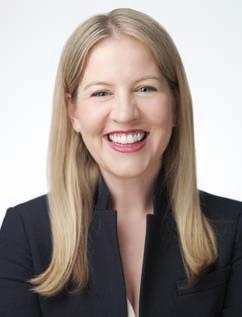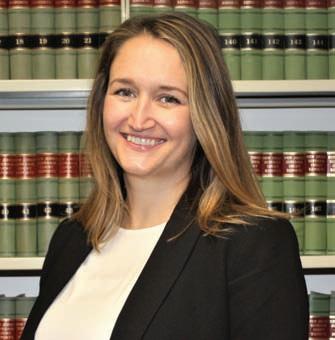
9 minute read
Emerging Leaders
Just Say Yes
Cait DeBaun, Vice President, Strategic Communications & Responsibility, American Gaming Association
Advertisement
You could say Cait DeBaun was thrown in the deep end. Though only three years into her career in gaming, she already has earned a lifetime of experience. Nine months after joining the American Gaming Association (AGA)—on the heels of a recordbreaking year for the industry and in the midst of preparing a campaign for the AGA’s 25th anniversary—casinos across the country were forced to close their doors indefinitely due to the Covid-19 pandemic.
“We had to switch gears overnight to ensure our industry was included in any federal relief like the CARES Act,” says DeBaun. “To rally a coalition of support in Congress, we needed to tell our story and what we mean for communities and the economy.”
She remembers learning of how AGA members were turning their kitchen supplies over to food banks, procuring needed personal protective equipment, or even the little details, like properties that had to go in search of padlocks because they had never physically locked their doors. And telling stories like that is part of what has drawn her to the industry.
“As a communications practitioner, I’ve never been more challenged,” says DeBaun, who began her professional life in agency public relations, where she supported a number of federal public health campaigns like childhood obesity and women’s heart health. Later, she led the U.S. Travel Association’s “Project: Time Off,” which famously advocated for the necessity of vacation time in an effort to grow domestic leisure travel.
“These were rewarding to be a part of,” she says, “but not exactly tough sells.” With gaming, she really has had to navigate headlines and work to sell the inherent benefits of the industry.
At one of her first AGA events, part of its “Get to Know Gaming” effort, DeBaun met a woman who had worked for MGM National Harbor cleaning jobsite trailers during its construction. When the time came to open, they asked if she could do the property cleanup. She’d never done such a thing, but she said yes, succeeded, and now has a company of her own with 30-plus employees. “These are the stories it’s exciting to find and tell because we build careers, businesses and economies,” she says.
Like the woman in her story, DeBaun credits much of her success to simply raising her hand and saying yes, “no matter how big or small the task.” As she explains, offering to make copies might get her into the meeting; taking good notes in the meeting might get her the writing assignment, and so on. “Early in my career, it helped to build rapport with colleagues and demonstrate to leaders I was a team player, curious, and could get things done.”
At the time DeBaun joined AGA, Senior Vice President Casey Clark was working to reframe how the industry thought and communicated about responsibility, and she was enthusiastic about the work. Simultaneously, gaming began to expand rapidly via state-by-state legalization of sports betting, giving the AGA the opportunity to define what responsibility looked like for this segment from the ground up.
“What an opportunity for my interests and background,” she says, which Clark recognized. He has continued to give her the space to grow and lead in this area. “I’ve been fortunate to have managers throughout my career that also became mentors. From my first job at a PR agency to my role today at the AGA, my bosses have invested in me not only for the benefit of the organization but as an individual and professional.”
Looking ahead, DeBaun is enthusiastic about the work AGA is doing on illegal markets. Much like her trial-by-fire work during the pandemic, their reinvigorated efforts in this area require strategic communications and coalition-building, public education and creativity, and will truly reflect what the AGA—and DeBaun—can do for the industry.
— Keli Elkins, The Innovation Group
Following Footsteps
Jamie McKelvey Deputy Attorney General, New Jersey Division of Gaming Enforcement

You might say Jamie McKelvey’s entrance into the Atlantic City gaming world was a foregone conclusion. Her mother worked for the Casino Control Commission, when she met her father, a New Jersey State Police officer assigned to the Division of Gaming Enforcement.
Indeed, McKelvey graduated Rutgers Law School in 2013, and in six years ended up as a deputy attorney general with the DGE, where she works in the service industry licensing bureau.
McKelvey grew up in Upper Township, a bedroom community to Atlantic City. Many of her neighbors worked for casinos or for businesses supporting the industry.
“My commitment to public service, instilled in me by my parents, led me to the Attorney General’s Office, and my personal connection to the Atlantic City area eventually brought me ‘home’ to the DGE,” she says.
McKelvey, who earned a bachelor of arts in political science and criminal justice from Rutgers in 2010, served as a county prosecutor for more than two years as her first position after a clerkship. In May 2017 she moved to the Attorney General’s Office, Division of Criminal Justice.
“I had the opportunity to learn about offshore gaming and the social and economic damage it can cause,” she says. “This sparked an interest in me in the regulation of legal gaming and sports wagering and the state’s approach to curtailing illegal gaming.”
With that, McKelvey transferred to the DGE, where among other tasks, she investigates and licenses individuals and organizations that do business with Atlantic City casinos, from non-gaming vendors to internet gaming and sports wagering operators.
“I direct investigations, review contracts and related documents, conduct sworn interviews and draft licensing recommendations. Much of my day is spent fielding inquiries from those in the gaming industry who are seeking to do business in New Jersey,” says McKelvey, who finds time to relax with a good book on the beach, a nice bonus of living in the Atlantic City area.
McKelvey cites Judge Patricia M. Wild, J.S.C. (ret.) as a mentor. She shared a similar career path. Wild served as a deputy attorney general in the DGE before working as in-house counsel for many of the Atlantic City casinos.
“Judge Wild has mentored me and provided guidance on being a woman in an industry that is predominantly male, to think critically, and to make decisions based on what is right, even if it is not the popular decision,” she says.
At the DGE, McKelvey has learned much from the guidance of Director David Rebuck, Deputy Director Lou Rogacki, and Deputy Attorneys General Mike Golub and Jen RussoBelles.
One thing seems evident: the gaming industry has a continual need for attorneys to carry out the legal necessities of the industry, especially in an ever-changing gaming world, McKelvey says.
“I recommend that lawyers find an area of gaming they find particularly interesting and learn all they can. When you are passionate about a given topic, you naturally flourish in that area, and with hard work you can become a go-to person on that topic.”
—Bill Sokolic
Remember Her Name
Agata Maher Director of Marketing Operations, Pechanga Resort Casino

Immediately upon meeting Agata Maher, you are impressed by her confidence and enthusiasm, and it is easy to understand why she was selected as an emerging leader in gaming.
Her career in the industry began 16 years ago at Harrah’s Resort SoCal in the San Diego area as special events coordinator. From there, she moved north to Morongo Casino Resort & Spa in Cabazon to oversee the players club and promotions as the Winners Club manager.
“I have been so fortunate to have worked for and still work with leaders who believe I am the perfect fit for their team,” she says. “They invested in me and today I do the same for others.”
In 2013, she joined Pechanga Resort Casino—the largest resort casino in California—and immediately put her management, planning and training skills to use increasing Pechanga’s club recruitment and enhancing the club experience for members. At the same time, she facilitated leadership courses for Pechanga’s managers that not only established a blueprint for the next generation of Pechanga’s leaders, but a footprint for her fellow leaders at Pechanga and in the gaming industry.
She credits her early career success to the value she placed in herself and her abilities.
“I kept a positive attitude about my work and did my darn best to inspire confidence in others,” she reflects. “That combined with an enormous work ethic set me apart and allowed me to capitalize on many opportunities.”
As the director of marketing operations at Pechanga, Maher oversees departments as disparate as club membership, special events and promotions, as well as entertainment. This means if she isn’t overseeing a giveaway for club members, she’s devising new ways to facilitate better processes to enable guests to enjoy Pechanga’s endless list of entertainment talent.
Tackling problems and difficult situations and turning them into success stories plays into Maher’s strength as someone who finds levels of comfort in areas that many would not. Maher is a change agent who is the connector and lynchpin to the marketing department and other key teams throughout the company.
“A leader’s duty is to care,” she observes. “I care about people and have compassion. I make an effort to know where they see themselves in the future and I keep that in mind when I see opportunities that can help propel them forward.” Through her strong leadership, her team is able to produce creative excellence and deliver on business and financial goals, establishing an environment of continuous capability growth and operations improvement.
Her advice to other young professionals is, first, to stay true to yourself.
“As I look back on my career to date, I am most proud that through all the years, I stayed true to who I was—a Polish immigrant girl who jokes that the best way to remember how to pronounce her name is to say ‘I-GOTTA-REMEMBER-HER-NAME.’”
She also advocates building strong relationships.
“Ensure you have good, trustworthy relationships with your colleagues as well as other external stakeholders,” she advises. “I strongly believe that having great relationships is essential to one’s success and growth within an organization.”
—Allison McCoy, The Innovation Group








